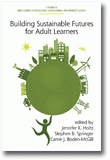
Building Sustainable Futures for Adult Learners
Edited by:
Jennifer K. Holtz, University of Arkansas at Little Rock
Stephen B. Springer, Texas State University
Carrie J. Boden, Texas State University
A volume in the series: Adult Learning in Professional, Organizational, and Community Settings. Editor(s): Carrie J. Boden, Texas State University.
Published 2014
Building Sustainable Futures for Adult Learners is an edited and refereed collection of papers published in conjunction with the joint Adult Higher Educational Alliance (AHEA) and American Association of Adult and Continuing Education Conferences (AAACE). This book is the third in a series of scholarly publications associated with the annual AHEA conference. The book is arranged thematically according to the topics of submissions. Building Sustainable Futures is important because it fills a unique niche in the field of adult education, extends the scope of AHEA to a larger audience, and offers a current volume for scholars and practitioners based on both research and practice-based research.
CONTENTS
Preface. Acknowledgements. Introduction, Stephen B. Springer, Carrie J. Boden-McGill, and Jennifer K. Holtz. PART I: SUPPORTING NEEDS OF ADULT LEARNERS: SUSTAINING ADULT LEARNERS IN HIGHER EDUCATION. Rebuilding Lives: Narratives of the Educational Experiences of Displaced Workers, Margaret A. Voelkel. Adult Degree Programs: Factors Impacting Student Persistence, Mathew J. Bergman, Kevin J. Rose, and M. Brad Shuck. Do Graduate Students Who Set Formal Goals Really Graduate at Higher Rates? Robert Collins, Jill Coddington, and Dorothy Williams. SUPPORTING ADULT STUDENT PARENTS. College Enrollment Choices Predicted by Social Capital, Academic Encouragement, Environment, and Student-Parent Differences, Elyse D’nn Lovell and Dustin Barnes. Torn between Three Worlds: Examining the Graduate School Experience of Women Balancing Doctoral Education, Motherhood, and Work, Aimee Tiu Wu. BUILDING FUTURES THROUGH CURRICULUM REVISION. Enhancing Meaning in Adult Higher Education through Arts Based Learning, Lisabeth Eames Capozzi. Re-visioning General Education through the Adult Baccalaureate Learning Experience, Diane Dick. Online Learning and Application of Active Learning Strategies: Adult Learners in Online Settings, Yu-Chun Kuo. Collaborations and Partnerships: The Foundation of Technology Enhanced Active Learning, Marilyn Lockhart and Lindsey Jackson. Adopting and Implementing Adult Learner-Focused Hybrid Teaching and Learning: One Institution’s Journey, Lori A. Peterson and Daniel M. McGuire. INTEGRATING ADULT LEARNING EXPERIENCES IN THE “REAL WORLD” Give Me a Real World Example: Teaching Adults Critical Comprehension Using Authentic Complex Texts, Leah Katherine Saal. Sustainability and Transitional Learning: Exploring the Influence of Adult Learners’ Mental Models on Adaptive Change, Brian S. Hentz. Negotiating Experience and Theory: Piloting Cornerstone and Capstone Courses to Build a Sustainable Future for an Interdisciplinary Graduate Degree Program, Stephen B. Springer, Omar S. Lopez, Matthew A. Eichler, Tennille J. Lasker-Scott, and Carrie J. Boden-McGill. Incidental Learning and Complexity in the Workplace, Michael D. Harner. ADVANCING ADULT LEARNING IN THE HEALTH PROFESSIONS. Staged Self-Directed Learning Model: Leaving the Nest—From Novice to Professional, Julie Hall. Blending for Sustainability: Aligning the Needs of Adult Learners and the Needs of Health Sciences Education, Paige L. McDonald, Howard O. Straker, and Laurie B. Lyons. Training Medical Faculty to Use Adult Learning Principles And Mentoring in Clinical Teaching, Kathy Peno, Elaine M. Silva Mangiante, and Rita Kenahan. When Adult Learning Practitioners Encounter Education in the Health Professions: Challenges to Theory and Practice, Teresa J. Carter and Laura P. Gogia. PART II: SUPPORTING ADULT LEARNING IN ORGANIZATIONS, INSTITUTIONS, AND COMMUNITIES: LEADING CHANGE TOWARD A SUSTAINABLE FUTURE FOR ADULT LEARNING. Collaborative Leadership for Sustained Partnerships, Margaret H. Rice. Shaping Leadership Culture: The Role of Adult Education in Developing and Sustaining the Next Generation of Women Leaders, Carmela R. Nanton. Advancing Innovation in Higher Education, Anna K. Hultquist. IMPLEMENTING FORWARD-LOOKING, COMPENTENCY-BASED MEASURES OF ADULT LEARNING. Prior Learning Assessment: Trends and Issues in U.S. Post-Secondary Education, Henry S. Merrill. What’s in Your Credit Hour? Quantifying Intended Learning Outcomes in Education, Frederick Carl Prasuhn and Scott Frasard. SUPPORTING PROFESSIONAL DEVELOPMENT FOR ADULT EDUCATORS. A Hypothetical Model to help Faculty members in the Use of Learning Contracts with the Students, Monica Fedeli, Ettore Felisatti, Cristina Mazzucco, and Mario Giampaolo. Personal and Professional Experiences to Develop Learning in Teachers’ Professional Qualification, Ettore Felisatti, Monica Fedeli, and Mario Giampaolo. Integrating Technology into Pedagogical Content Knowledge in K–12 and University Professional Development, Kathleen B. Fabrikant, Cindy S. York, and Megan E. Morris. Developing a Repertoire of Practice: Online Instructor Dispositions and Personalities, Jeral R. Kirwan and Elizabeth Roumell. EXPLORING LOCAL AND GLOBAL PARTNERSHIPS TO SUSTAIN ADULT LEARNING. Creating Strong Partnerships through Community Coalitions, Clint Cummings and Karen Franck. The Development of Appalachian Adult Learners Under Globalization: A Transformative Perspective, Fujuan Tan, Lee Nabb, and Robert Sammons. Globalization of Curricula Through Partnerships: Building Competitive Global Learner Capacity, Amy Rell and Roxanne Gonzales. Conclusion, Jennifer K. Holtz, Carrie J. Boden-McGill, and Stephen B. Springer. About the Contributors.
-
Paperback9781623968717
Web price: $62.04 (Reg. 72.99)
-
Hardcover9781623968724
Web price: $89.24 (Reg. 104.99)
- eBook9781623968731

- EDU000000 - EDUCATION: General
- EDU002000 - EDUCATION: Adult & Continuing Education
- EDU015000 - EDUCATION: Higher
-
 A Guide to College Success for Post-traditional Students
2nd Edition
A Guide to College Success for Post-traditional Students
2nd Edition
-
 Advancing the Global Agenda for Human Rights, Vulnerable Populations, and Environmental Sustainability
Advancing the Global Agenda for Human Rights, Vulnerable Populations, and Environmental Sustainability
-
 Leaps of Faith
Stories from Working-Class Scholars
Leaps of Faith
Stories from Working-Class Scholars
-
 Teaching and Learning for Adult Skill Acquisition
Applying the Dreyfus and Dreyfus Model in Different Fields
Teaching and Learning for Adult Skill Acquisition
Applying the Dreyfus and Dreyfus Model in Different Fields
-
 Transformative Learning in Healthcare and Helping Professions Education
Building Resilient Professional Identities
Transformative Learning in Healthcare and Helping Professions Education
Building Resilient Professional Identities
-
 Trauma in Adult and Higher Education
Conversations and Critical Reflections
Trauma in Adult and Higher Education
Conversations and Critical Reflections
-
 Unfinished Business
Compelling Stories of Adult Student Persistence
Unfinished Business
Compelling Stories of Adult Student Persistence

